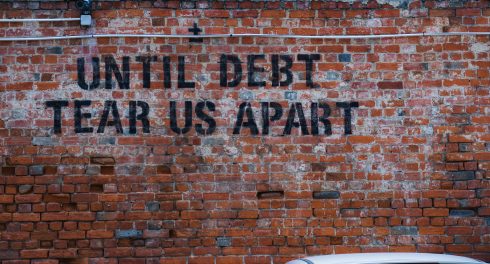Highlights:
- Philanthropic performance anxiety
- Technology vs corruption: which one wins?
- Tone down expectations of machines and watch out for giant evils
- In sight but still out of mind
- Get your community groove on
- TAI spotlight: From increasing budget awareness to whistleblowers for change
In case you missed it…
Philanthropic performance anxiety
 Photo: Unsplash
Photo: Unsplash
It’s Giving Tuesday, so we kick off this week in the world of philanthropy. Janet Camarena emphasizes the value of shifting to a culture of learning to improve foundations’ efforts, reinforced by increasing transparency around grantmaking. As a donor collaborative, we are unsurprised that three-quarters of foundation CEOs use accessible information from peer foundations to inform their own strategy and direction but would welcome more data-sharing. Check out other more findings from Center for Effective Philanthropy’s Understanding and Sharing What Works and pair with the MacArthur Foundation’s (TAI member) 100&Change competition report on lessons learned to improve grantmaking, boost collaboration and knowledge-sharing.
Feedback from clients or guarantees is a rich learning resource for funders. Last month’s survey of close to 2,000 social sector leaders has some eye-opening insights. For example, 88% of respondents see collecting client feedback as a priority but two-thirds of them struggle to find time and resources to do it. How might funders encourage the necessary resource investment?
Technology vs corruption: which one wins?
Despite decent anti-corruption institutions, active civil society, and a fairly free press, corruption seems to be ingrained in many countries. How can technology be used to deter corruption? MySociety’s newly launched report explores how digital tools for parliamentary openness and engagement are operating in Sub-Saharan Africa, and how future tools can be better designed and targeted to achieve greater social impact and civic engagement. Claiming poverty but have 10 Mercedes parked outside your dacha? Watch out – Dan Peleschuk makes a case for using drones to tackle corruption. Governments and CSOs of Zimbabwe, Malawi, and Ukraine have used them in various investigations, but how long before powers-that-be attempt to regulate away drone surveillance? Some more typical human investigative oversight is at work in Mongolia to expose looting of a fund intended to boost the country’s struggling SME sector.
Meanwhile, Transparency and accountability advocates tend to rely on indices (Open Budget Index, Resource Governance Index, etc.) as proxies for progress in a field with often intangible results, but how much stock should we put in them? The continued controversies over the World Bank Doing Business rankings highlight the risks of countries gaming the system.
We are looking forward to Oxfam America’s forthcoming report on auditing in the extractives sector, but in the meantime revelations of poor financial health at Zimbabwe’s state diamond company points to the value of the work of auditor generals. Pair it with Global Witness’ further analysis of how top oil giants Shell and Eni set up a deal to deprive Nigeria of $6 billion tax payer’s money (the trial of several of their executives continues to wind its way through the Italian courts).
Finally, explore data visualizations courtesy of the Extractives Hub. Check out resource dependency, production and the like for different countries.
Tone down expectations of machines and watch out for giant evils
Algorithms increasingly form part of our everyday life. How can we use them to increase openness and transparency? Lucy Bernholz argues that they only work if the system is just and open. Therefore, instead of assuming that algorithms will produce better outcomes and hope they don’t accelerate discrimination we should accept they will be discriminatory and inequitable unless designed specifically to redress these issues.
The rising information overload has also led to an increase in mistrust in information and its sources. How does this information crisis manifest? Through the ‘five giant evils’ of confusion, cynicism, fragmentation, irresponsibility, and apathy. So say LSE researchers in a new reportthat examines how changes in the UK media system have resulted in an information crisis and the new difficulty of achieving informed debate. The UK is obviously far from alone in facing such challenges. Their core recommendation? Creating an independent platform agency to coordinate efforts to reinforce information reliability.
In sight but still out of mind
Last week we highlighted how the editorial board at the Financial Times called on Goldman Sachs to do far more to strengthen their risk and compliance culture. Seems they are not alone. A new survey indicates that Boards of directors at banks aren’t sufficiently engaged around compliance with rules to prevent money laundering and sanctions breaches. The survey was conducted on 370 banks. 44% of respondents didn’t provide AML or sanctions training and regular briefings to their boards. 41% of them didn’t perform annual reviews of their programs.
Elsewhere, a French bank Société Générale has agreed to pay $1.34B in penalties to settle allegations that the bank had processed and concealed billions of dollars in transactions related to countries under sanctions, including Iran, Cuba, and Sudan. Pair it with the latest from Danske Bank (Denmark) where the Chairman will step down after $230B money laundering scandal. And how Dutch police arrest a man on suspicion of money launderingafter finding 350,000 euros (US$400,000) hidden inside his washing machine.
To wrap, O’Melveny has released a guideline on AML compliance for fintech companies that describes the applicable regulations and recommended compliance measures.
Get your community groove on
At the recent GPSA Forum, many highlighted the difficulty of generating dialogue and engaging communities in local governance. It has also been difficult for donors to fund such kind of activities. That’s why it is refreshing to read Philadelphia initiative’s use of philanthropy in motivating cities to expand both dialogue and community action thus improving residents’ interactions with local government to re-ignite civic engagement. Would it work in Ouagadougou? Maybe not but looking at examples worldwide might point to underlying principles of effectiveness.
Of course, trust was another GPSA conversation thread and Dan Cardinali suggests we might start by rebuilding trust in CSOs which means rebuilding trust in each other.
Wondering how to channel journalism towards keeping the government accountable and improving service delivery? Transparency International outlines key steps from getting a hunch to building a successful reporting investigation. Meanwhile, the risks that journalists run in doing such work continue to be brought home starkly each week – see the latest case from Vietnam and of a Bangladeshi photojournalist.
Essential Listening and Viewing
Ed Rekosh of Rights CoLab joins Rule of Law Talk to talk about his new report with Lamin Khadar “The Business Case for Civil Society.” He outlines the roles that businesses and civil society organizations play in building a broad-based rule of law culture in society. Listen Now!

TAI spotlight
Increasing Budget Awareness | TAI
TAI’s latest blog by Oluseun Onigbinde from BudgIT titled “BudgIT’s Experience: Increasing Budget Awareness and creating Pathways to Civic Action and Engagement” outlines the simple ways they are using to promote public discourse around Nigeria budget and to increase citizen engagement. The discussions draw from our own Nigeria Data vs Corruption brief.
Corporate registers to fight corruption | DFID
Penny Mordaunt explains DFID interest in a global norm of beneficial ownership disclosure and related UK Aid investments.
Civic Tech Innovation Network(CTIN)| Luminate Group
Ory Okolloh explains why they gave a grant of $215,000 to CTIN to further leverage tech for civic engagement and accountability.
Whistleblowers for Change| Open Society Foundations
The report provides a detailed study of whistleblowing and how to make it effective using a case of seven EU member states and Serbia as a comparator.
We are excited to welcome our new Program Associate, Richard Christel to the TAI team. Welcome, Richard!

Calls: Proposals, papers, speakers and course invites
- Call for Research for the Feminist Open Government Initiative – November 30
- Call for applications on strengthening women’s and girls’ movements – December 7
- Call for Papers & Panels for Tax Justice Network Conference – December 14
- RightsCon Tunis Call for Proposals – December 14
On the calendar
- Outcome-Oriented Monitoring, Evaluation & Learning – December 3-5 (Nairobi, Kenya)
- Data on Purpose Conference – February 19-20 (Stanford, CA)
- Open Data Day – March 2, 2019
- TICTec Research Conference – March 19-20, 2019 (Paris, France)
- The CEP Conference – May 7-9, 2019 (Minneapolis, USA)
- Csv, conf, v4 – May 8-9, 2019 (Eliot Centre, Portland)
- Collective Impact Forum Convening – May 14-16, 2019 (Chicago, USA)
- 2019 Open Government Partnership Global Summit – May 29-31, 2019 (Ottawa, Canada)
- RightsCon Tunis – June 11-14, 2019 (Tunis, Tunisia)
- Global Conference on Transparency Research – June 26 – 27, 2019 (Rio de Janeiro, Brazil)
- Tax Justice Network Conference 2019 – July 2 -3, 2019 (City, University of London, UK)


